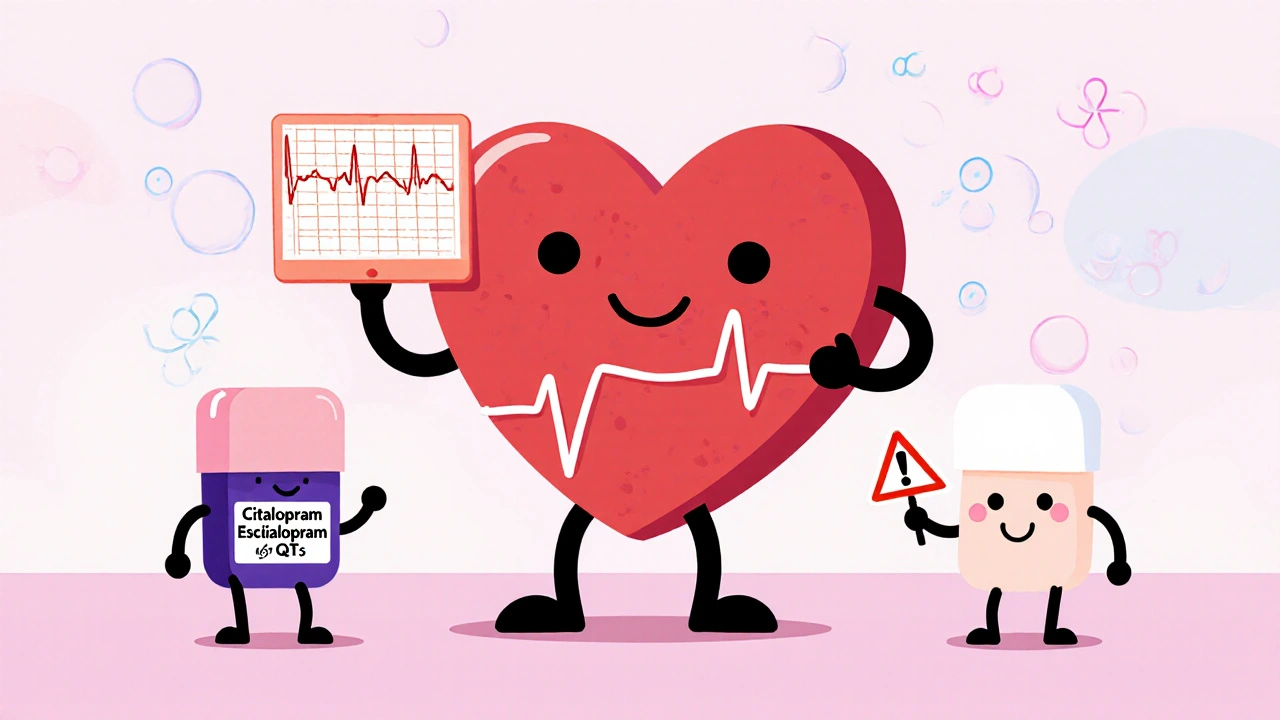Citalopram QT Prolongation: Risks, Signs, and What You Need to Know
When you take citalopram, a selective serotonin reuptake inhibitor (SSRI) used to treat depression and anxiety. Also known as Celexa, it helps millions manage mood disorders—but it can also affect your heart in ways most people don’t expect. One of those ways is through QT prolongation, a change in the heart’s electrical cycle that can lead to dangerous irregular rhythms. This isn’t just a footnote in the prescribing info—it’s a real, measurable risk that needs attention.
QT prolongation happens when the heart takes longer than normal to recharge between beats. On an ECG, that shows up as a stretched-out QT interval. For most people, this doesn’t cause problems. But for some, especially those taking higher doses of citalopram, already having heart issues, or using other drugs that affect the heart, it can trigger a life-threatening rhythm called torsades de pointes. The FDA warns against doses over 40 mg per day for this very reason. Even 20 mg can be risky if you’re older, have low potassium or magnesium, or take other meds like certain antibiotics or antifungals that also stretch the QT interval.
It’s not just about the dose. Genetics play a role too. Some people naturally have longer QT intervals, and citalopram can push them over the edge. That’s why doctors check your heart history before prescribing it—and why you should speak up if you’ve ever passed out for no reason, felt your heart race unexpectedly, or had a family member with unexplained sudden cardiac death. It’s also why labs for electrolytes are often ordered when you start or increase your dose. Low potassium or magnesium? Those need fixing before you keep taking citalopram.
And it’s not just citalopram. Other SSRIs like escitalopram can do the same thing, though usually less strongly. But citalopram has the clearest warning and the most documented cases. If you’re on it and your doctor hasn’t talked about your heart health, ask. If you’re on other meds too, bring the full list. Many people don’t realize that over-the-counter antihistamines, some acid reflux drugs, or even herbal supplements like St. John’s wort can add to the risk.
What you’ll find in the posts below aren’t just scattered facts—they’re real, practical stories and science-backed advice from people who’ve dealt with this, doctors who’ve managed it, and guides that help you spot trouble before it hits. You’ll learn how to track your own symptoms, what questions to ask your pharmacist, how to read your ECG results, and which alternatives might be safer if your heart can’t handle citalopram. This isn’t fear-mongering. It’s about taking control so you can keep using medication that helps your mood without risking your heart.

Citalopram and Escitalopram: QT Prolongation Risks and Safe Dose Limits
Haig Sandavol Nov 23 14Citalopram and escitalopram can prolong the QT interval, raising the risk of dangerous heart rhythms. Learn the safe dose limits, who’s at risk, and why escitalopram is often preferred over citalopram for cardiac safety.
More Detail